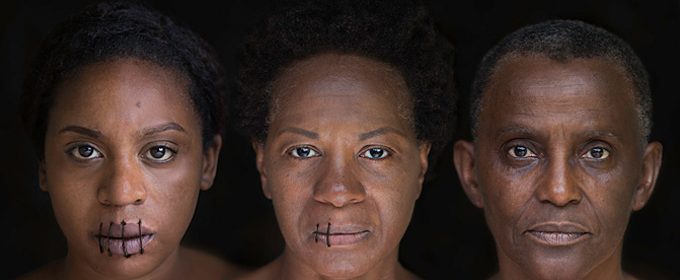Bullet Hole at Park Theatre

Bullet Hole at Park Theatre
Despite some brilliant acting, and a fabulously intense atmosphere, Bullet Hole was let down by far too many unanswered questions that left the audience constantly trying to understand the subtext rather than paying attention to the raw emotion on stage.
 Unnecessarily cryptic and slow, this 90 minute one-act play missed the mark for me.
Unnecessarily cryptic and slow, this 90 minute one-act play missed the mark for me.
At times, I found myself shaking my head, as yet another unanswered question came forth, despite none of the previous being answered. I’m sure the writer, Gloria Williams, had answered these questions to herself, as it was clear the whole play was very well thought out, with intricate details being revealed as and when Williams desired, through clever use of scripting and body language from all three actors. However, the fundamental questions I carried throughout were too profound and therefore drowned out any desire to take on any more subtle hints of plot.
My biggest question is, for example, why were they all there, at Winnie’s house? They have husbands at home waiting for them so there must be a reason, but we never find out. Or why Cleo, played by Williams, is suddenly now having such a crisis. She received her ‘gift’, Type 3 FGM, at age 7, and is now 25-30, so why is she now so traumatised by it that she won’t speak or eat, and has frequent breakdowns. I’m sure Williams had an answer, but why we were never allowed to know, I cannot fathom. And thus, this was added to a list of questions that slowly wore away at my suspended disbelief, bringing me back to a theatre, watching a play.
 The original impression suggests daughter, mother, grandmother, in a house together. The dynamics shift when we realise Winnie is Cleo’s aunt, and Winnie has taken in Eve, played by Doreene Blackstock. Blackstock plays Eve well throughout, flipping between for and against the procedure. But why Eve is there and not at home with her husband, who she seems to love, is unclear.
The original impression suggests daughter, mother, grandmother, in a house together. The dynamics shift when we realise Winnie is Cleo’s aunt, and Winnie has taken in Eve, played by Doreene Blackstock. Blackstock plays Eve well throughout, flipping between for and against the procedure. But why Eve is there and not at home with her husband, who she seems to love, is unclear.
I thought perhaps all would be revealed in a twist halfway, and then the play would really get going, alas, very few of my questions were answered. This meant I left the theatre brimming with questions, and feeling like I’d just scraped the surface on issues in the UK and abroad relating to Female Genital Mutilation. When I first heard of the production, I was excited to learn and really explore some deeper themes from someone who’d really done their research, I was eager to see how it affects women and why it happens. For attacking such a serious and important issue, I applaud Williams, but I fear audiences will leave the theatre no more the wiser as to how widely spread this is, why it happens, or what exactly it involves.
Cleo’s argument for the reversal is clear and understandable, but Winnie, played by Anni Domingo, has no clear argument for the procedure. She talks in frustrating metaphors and seemingly random anecdotes, to come to her own solution at the end of her ramblings. Perhaps this was Williams’ intention. She had believable arguments dotted through the play, but with her useful lines delivered sporadically, it was frustrating to try and collect it all and put together her views. That being said, Domingo played the part better than I could ever have imagined. She brought humour, integrity, and genuine emotion to the role, and deserves our highest applause.
Nearly all of my problems with this play could have been solved with some easy, cheesy exposition. It’s by no means a perfect solution, but better still than frustratingly trying to grasp at what each character is alluding to for 90 minutes.
Many odd scenes still need explaining for me. Did I imagine lesbian connotations in there, which seems to be mentioned once or twice and then never mentioned again? Is Winnie mentally stable as she seems to be throughout, excluding one odd scene, which again is never touched upon thereafter?
It must be said, Williams’ does a fantastic portrayal of Cleo, full of emotion and wonderfully juxtaposed to Domingo’s Winnie, which made for a brilliant dynamic between the two. She captured the frustration and emotion, effortlessly and believably. But in her writing, she answered the wrong questions, thus leaving her audience estranged, like outsiders struggling to empathise.
Bullet Hole, with its solidly dark theme, makes for an emotionally draining 90 minutes, and leaving the audience constantly working out what was happening, made the whole production exhausting to watch.
Review by Mims Melville
To find out more about Bullet Hole visit Park Theatre’s website.
If you like this review you might also like Musical Theatre Musings reviews of The Other Place and Beirut both. at Park Theatre
